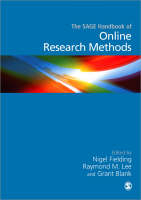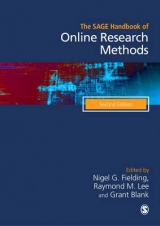
The SAGE Handbook of Online Research Methods
SAGE Publications Inc (Verlag)
978-1-4129-2293-7 (ISBN)
- Titel erscheint in neuer Auflage
- Artikel merken
This handbook is the first to provide comprehensive, up-to-the-minute coverage of contemporary and developing Internet and online social research methods, spanning both quantitative and qualitative research applications.
The editors have brought together leading names in the field of online research to give a thoroughly up to date, practical coverage, richly illustrated with examples. The chapters cover both methodological and procedural themes, offering readers a sophisticated treatment of the practice and uses of Internet and online research that is grounded in the principles of research methodology. Beginning with an examination of the significance of the Internet as a research medium, the book goes on to cover research design, data capture, online surveys, virtual ethnography, and the internet as an archival resource, and concludes by looking at potential directions for the future of Internet and online research.
The SAGE Handbook of Internet and Online Research Methods will be welcomed by anyone interested in the contemporary practice of computer-mediated research and scholarship. Postgraduates, researchers and methodologists from disciplines across the social sciences will find this an invaluable source of reference.
Nigel Fielding, BA (Sussex) MA (Kent) PhD (LSE), is Emeritus Professor of Sociology at the University of Surrey, a Fellow of the Academy of Social Sciences, and a member of the Community of Experts of the European Science Foundation, and served on the Mixed Methods Research Association’s presidential task force on the future of mixed methods. His interests in research methodology include mixed methods, socio-spatial methods, qualitative software, interview methods, field observation, and digitally-mediated fieldwork. Nigel has authored/edited 27 books, many in research methodology, including The SAGE Handbook of Online Research Methods, Sage, 2018 (second edition), with Grant Blank and Ray Lee. Raymond M. Lee is Emeritus Professor of Social Research Methods at Royal Holloway University of London. He has written extensively about a range of methodological topics. These include the problems and issues involved in research on ‘sensitive’ topics, research in physically dangerous environments, the use of unobtrusive measures, and the role of new technologies in the research process. His current research focuses on the historical development of interviewing techniques. Grant Blank is Survey Research Fellow at Oxford Internet Institute (OII), University of Oxford. He is a sociologist who studies the social and cultural impact of the Internet and other new communication media. He is also interested in cultural sociology, especially reviews and cultural evaluation.Grant began his career as an independent consultant based in Chicago Illinois specializing in research design, statistical analysis, and database design. He previously taught at American University in Washington DC. He completed his PhD on the sociology of reviews at the University of Chicago in 1999, and joined OII in 2010.
Section I. The Internet as a research medium
Chapter 1: The Internet as a research medium: an editorial introduction to the Sage Handbook of Online Research Methods - Ray Lee, Nigel Fielding and Grant Blank
Section II. Designing Internet research
Chapter 2: The Ethics of Internet research - Rebecca Eynon, Jenny Fry and Ralph Schroeder
Chapter 3: Understanding and Managing Legal Issues in Internet Research - Andrew Charlesworth
Chapter 4: Research design and tools for Internet research - Claire Hewson and Dianna Laurent
Chapter 5: General approaches to data quality and Internet generated data - Karsten Boye Rasmussen
Section III. Data capture using the Internet
Chapter 6: Middleware for Distributed Data Management - Alvaro A.A. Fernandes
Chapter 7: Distilling Digital Traces: Computational social science approaches to studying the Internet - Ted Welser, Marc Smith, Danyel Fisher and Eric Gleave
Chapter 8: Analysing Social Networks via the Internet - Bernie Hogan
Chapter 9: Nonreactive Data Collection on the Internet - Dietmar Janetzko
Section IV. The Internet survey
Chapter 10: Overview: online surveys - Vasja Vehovar and Katja Lozar Manfreda
Chapter 11: Sampling methods for Web and E-mail Surveys - Ronald Fricker
Chapter 12: Internet survey design - Samuel Best and Brian Krueger
Chapter 13: Internet survey software tools - Lars Kaczmirek
Section V. Virtual ethnography
Chapter 14: Overview: Virtual ethnography: modes, varieties, affordances - Christine Hine
Chapter 15: Internet-based Interviewing - Henrietta O′Connor, Clare Madge, Robert Shaw, Jane Wellens
Chapter 16: Online focus groups - Ted Gaiser
Chapter 17: Fieldnotes in public: using blogs for research - Nina Wakeford and Kris Cohen
Chapter 18: Research Uses of Multi-user Virtual Environments - Ralph Schroeder and Jeremy Bailenson
Chapter 19: Distributed Video Analysis in Social Research - Jon Hindmarsh
Section VI. The Internet as an archival resource
Chapter 20: The Provision of Access to Quantitative Data for Secondary Analysis - Keith Cole, Louise Corti and Jo Wathan
Chapter 21: Secondary Qualitative Analysis using Internet Resources - Patrick Carmichael
Chapter 22: Finding and Investigating Geographical Data Online - David Martin, Samantha Cockings and Samuel Leung
Chapter 23: Data Mining, Statistical Data Analysis, or Advanced Analytics: Methodology, Implementation, and Applied Techniques - Bert Little and Michael Schucking
Chapter 24: Artificial Intelligence and the Internet - Ed Brent
Section VII. The future of social research on the Internet
Chapter 25: Longitudinal Statistical Modelling on the Grid - Rob Crouchley and Rob Allan
Chapter 26: Qualitative e-Social Scienceber-research - Nigel Fielding and Ray Lee
Chapter 27: New Cartographies of ′Knowing Capitalism′ and the Changing Jurisdictions of Empirical Sociology - Michael Hardey and Roger Burrows
Chapter 28: The Internet and the Future of Social Science Research - Mike Fischer, Stephen Lyon and David Zeitlyn (Kent).
Chapter 29: Online Research Methods and Social Theory - Grant Blank
Section VIII.
Glossary of Key Terms.
| Erscheint lt. Verlag | 24.6.2008 |
|---|---|
| Verlagsort | Thousand Oaks |
| Sprache | englisch |
| Maße | 174 x 246 mm |
| Gewicht | 1230 g |
| ISBN-10 | 1-4129-2293-3 / 1412922933 |
| ISBN-13 | 978-1-4129-2293-7 / 9781412922937 |
| Zustand | Neuware |
| Haben Sie eine Frage zum Produkt? |
